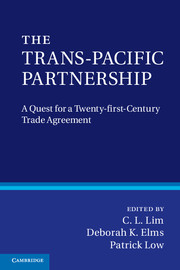Book contents
- Frontmatter
- Contents
- List of Figures and Tables
- Contributors
- Preface
- Acknowledgements
- Disclaimer
- Glossary
- Part I Introduction
- Part II The past: origins of the TPP Agreement
- Part III The present: twenty-first century elements and obstacles
- 6 Negotiations over market access in goods
- 7 TPP negotiations
- 8 Trade in services
- 9 TPP Agreement
- 10 The intellectual property chapter in the TPP
- 11 Regulatory coherence in the TPP talks
- 12 Environmental issues in the TPP
- 13 Labour standards and the TPP
- 14 What is to be done with export restrictions?
- Part IV The future: high-quality meets regional and global realities
- Part V The TPP negotiations: the quest for quality
- Index
- References
13 - Labour standards and the TPP
Published online by Cambridge University Press: 05 November 2012
- Frontmatter
- Contents
- List of Figures and Tables
- Contributors
- Preface
- Acknowledgements
- Disclaimer
- Glossary
- Part I Introduction
- Part II The past: origins of the TPP Agreement
- Part III The present: twenty-first century elements and obstacles
- 6 Negotiations over market access in goods
- 7 TPP negotiations
- 8 Trade in services
- 9 TPP Agreement
- 10 The intellectual property chapter in the TPP
- 11 Regulatory coherence in the TPP talks
- 12 Environmental issues in the TPP
- 13 Labour standards and the TPP
- 14 What is to be done with export restrictions?
- Part IV The future: high-quality meets regional and global realities
- Part V The TPP negotiations: the quest for quality
- Index
- References
Summary
The Trans-Pacific Partnership (TPP) Agreement will include a chapter on labour standards because US negotiators will insist on it. The original P4 Agreement includes a memorandum of understanding on workers’ rights issues, but it is vague, hortatory and involves no legally binding obligations. Other non-US trade agreements among TPP partners contain few, if any, references to this issue, beyond provisions on the temporary movement of workers, but that is different from the rights at work covered by labour standards. Because developing countries acting collectively were able to block US initiatives, there is only one limited provision in international trade rules that explicitly addresses labour standards. But the United States generally has more leverage in bilateral negotiations, and every US preferential trade agreement (PTA) since the North American Free Trade Agreement in 1993 includes binding obligations relating to workers’ rights and labour law enforcement.
One of the last pieces of TPP text to be tabled was an incomplete draft labour chapter that was circulated by the US delegation during the ninth round of negotiations in Lima, Peru, in late October 2011. A complete text was reportedly circulated at the end of the year, but it remains confidential. While labour standards are an issue that generally pits US negotiators against partners that range from mildly supportive to indifferent to resistant, they are one of the last issues to be broached because they raise sensitive political issues at home as well. Before turning to the negotiating challenges and opportunities, however, it is useful to briefly review the debate over whether to link trade and workers’ rights at all.
- Type
- Chapter
- Information
- The Trans-Pacific PartnershipA Quest for a Twenty-first Century Trade Agreement, pp. 200 - 210Publisher: Cambridge University PressPrint publication year: 2012
References
- 4
- Cited by

